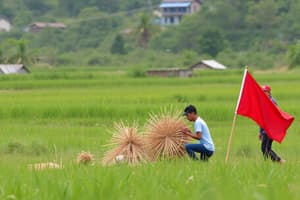Podcast
Questions and Answers
Apa yang menjadi fokus kebijakan ekonomi pemerintah Indonesia?
Apa yang menjadi fokus kebijakan ekonomi pemerintah Indonesia?
- Stabilitas mikroekonomi
- Peningkatan regulasi bisnis
- Eksploitasi sumber daya alam
- Pengembangan infrastruktur (correct)
Apa yang menjadi ciri khas kebijakan luar negeri Indonesia?
Apa yang menjadi ciri khas kebijakan luar negeri Indonesia?
- Ketergantungan-Intensif
- Bebas-Aktif (correct)
- Tertutup-Pasif
- Terbuka-Reaktif
Apa sektor ekonomi terbesar di Indonesia?
Apa sektor ekonomi terbesar di Indonesia?
- Sektor pertanian
- Sektor manufaktur
- Sektor pariwisata
- Sektor jasa (correct)
Bagaimana sikap Indonesia terhadap konflik Rusia-Ukraina?
Bagaimana sikap Indonesia terhadap konflik Rusia-Ukraina?
Jenis ekonomi apa yang dimiliki oleh Indonesia?
Jenis ekonomi apa yang dimiliki oleh Indonesia?
Organisasi regional mana yang diikuti oleh Indonesia?
Organisasi regional mana yang diikuti oleh Indonesia?
Apa yang merupakan salah satu fokus utama dalam sistem pendidikan Indonesia?
Apa yang merupakan salah satu fokus utama dalam sistem pendidikan Indonesia?
Apa konsep yang menjadi pusat nasionalisme Indonesia?
Apa konsep yang menjadi pusat nasionalisme Indonesia?
Siapakah yang merupakan kepala negara dan pemerintahan di Indonesia?
Siapakah yang merupakan kepala negara dan pemerintahan di Indonesia?
Apa lembaga legislatif yang terdiri dari Dewan Perwakilan Rakyat dan Dewan Perwakilan Daerah di Indonesia?
Apa lembaga legislatif yang terdiri dari Dewan Perwakilan Rakyat dan Dewan Perwakilan Daerah di Indonesia?
Apa peran utama birokrasi dalam sistem politik dan administrasi Indonesia?
Apa peran utama birokrasi dalam sistem politik dan administrasi Indonesia?
Bagaimana ekonomi dan politik Indonesia dipengaruhi?
Bagaimana ekonomi dan politik Indonesia dipengaruhi?
Flashcards are hidden until you start studying
Study Notes
Indonesia: Economy and Politics
Indonesia, the world's fourth most populous nation, is a Southeast Asian archipelago of 17,000 islands with a rich history and culture. The country is known for its natural resources, including oil, natural gas, and minerals, as well as its agriculture, forestry, and tourism industries. This article will explore Indonesia's economy and politics, focusing on the subtopics of foreign policy, education, and nationalism.
Economy
Indonesia has a mixed economy with a large agricultural sector, a rapidly growing manufacturing sector, and a substantial service sector. The country's economy is the largest in Southeast Asia and is the world's 16th largest economy by nominal GDP. The government has implemented policies to improve economic efficiency, including a focus on infrastructure development, macroeconomic stability, and reducing business regulations.
Foreign Policy
Indonesia's foreign policy is characterized by the concept of "Bebas-Aktif" or "Free-Active," which emphasizes independence and active participation in international affairs. In response to the Russia-Ukraine conflict, Indonesia has adopted a neutral stance, advocating for dialogue and diplomacy to resolve the crisis. The country has also been actively involved in regional organizations such as the Association of Southeast Asian Nations (ASEAN) and the United Nations (UN).
Education
Indonesia has a comprehensive education system that includes primary, secondary, and tertiary education. The government has implemented policies to improve the quality of education, including the implementation of the National Education System (Sistem Pendidikan Nasional) and the establishment of the Directorate General of National Education. Additionally, the country has a strong focus on vocational education and training, which is seen as crucial for economic development.
Nationalism
Indonesia's nationalism has been shaped by the country's history, culture, and political developments. The concept of "Pancasila" is central to Indonesian nationalism, emphasizing the unity of the Indonesian people and the importance of social justice and democracy. Nationalism has also been expressed through the promotion of traditional political cultures, which can be seen in the country's elections and political parties.
Politics
Indonesia is a unitary state with a presidential system of government. The country has a bicameral legislature, with the Dewan Perwakilan Rakyat (DPR) or House of Representatives and the Dewan Perwakilan Daerah (DPD) or Regional Representatives Council. The president is both the head of state and government and is elected by the DPR.
Bureaucracy
Bureaucracy plays a significant role in Indonesia's political and administrative system. The country has a complex bureaucratic structure, with various layers of administration at the national, provincial, and district levels. The bureaucracy is also responsible for implementing policies and regulations.
Politics and Nationalism
Politics and nationalism in Indonesia have been intertwined, with the country's history and culture shaping its political landscape. The country's nationalism has been expressed through various forms, including the promotion of traditional political cultures and the development of policies that support the unity and well-being of the Indonesian people.
In conclusion, Indonesia's economy and politics are shaped by a variety of factors, including its natural resources, foreign policy, education system, and nationalism. The country has implemented policies to improve its economic efficiency and reduce business regulations while maintaining a neutral stance in international conflicts. Additionally, Indonesia's political system emphasizes the unity of the Indonesian people and the importance of social justice and democracy.
Studying That Suits You
Use AI to generate personalized quizzes and flashcards to suit your learning preferences.




